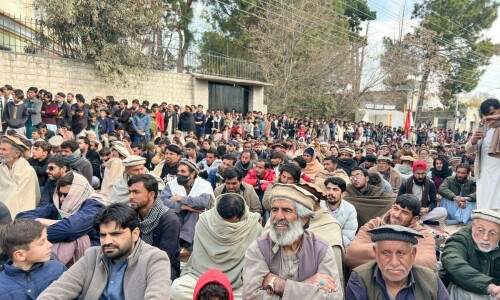PESHAWAR: Governor Faisal Kareem Kundi has expressed concerns over absence of women members of senates and syndicates of public sector universities and termed it a violation of Khyber Pakhtunkhwa Universities Act, 2012.
The governor, who is chancellor of public sector universities, has directed all the vice-chancellors of universities to ensure representation of women in the major decision making bodies of the institutions.
An official letter sent to all VCs has cited different sections of KP Universities Act, 2012, regarding representation of women in the senate and syndicate of each public sector university
Section 19 (7) of the law states: “At least three members of the senate shall be female.” Similarly, Section 22(3A) of the law says that at least three members of the syndicate should be female.
According to law both decision making bodies should have at least three female members
“The governor of Khyber Pakhtunkhwa has taken serious notice of non-compliance with these provisions in several universities. You are therefore directed to ensure immediate compliance, ensuring female representation as stipulated by law,” states the letter.
The chancellor has directed all VCs to take immediate action to ensure full compliance with the law. The inclusion of at least three female members in both the senate and syndicate should be prioritised, reflecting his commitment to gender equity and the empowerment of women in all spheres of society.
“In this regard, report should be submitted within fortnight for perusal of the governor,” says the letter.
According to the law, syndicate consists of 14 members with vice-chancellor of the respective university as its chairperson. Its other members include a retired judge to be nominated by chief justice of Peshawar High Court; all the deans of the faculties of the university; secretaries of finance, establishment and higher education departments or their nominees not below the rank of an additional secretary; two principals preferably one male and one female of affiliated colleges to be nominated by the academic council; one each from professors, associate professors, assistant professor and lecturers of the university to be elected by teachers of their respective cadres; one principal or chairman or director of the teaching department to be elected from amongst themselves; one administrative officer registrar; treasure; one nominee of the commission; and one person of eminence to be nominated by the chancellor.
Similarly, senate also consists of 14 members with chancellor as chairperson. Other members of the senate are pro-chancellor; vice-chancellor; one member of provincial assembly to be nominated by the speaker; a retired judge to be nominated by chief justice of PHC; secretaries of finance, establishment and higher education departments or their nominees; chairman of HEC or his nominee; one eminent or distinguished graduates of the university; two persons from the academic community of the province or the country other than an employee of the university, at the level of professor or principal, to be appointed by the chancellor; one each from professors, associate professors, assistant professor and lecturers of the university to be elected by teachers of their respective cadre; four persons from society at large being persons of distinction in the different fields to be nominated by the chancellor; and one university administrative officer to be elected from amongst all the administrative officers.The general secretary of Federation of All Pakistan Universities Academic Staff Association (Fapuasa), Dr Uzair, when contacted, said that vice-chancellors had little power to nominate any female as member of senate or syndicate.
“The universities Act has made it mandatory to include three female members in both bodies but the law is silent on the mechanism of their inclusion,” he said.
Mr Uzair, who is also president of Peshawar University Teachers Association (Puta), said that instead of VCs, the chancellor should issue directives to HEC and administrative departments to send one or two female for attending senate or syndicate meetings.
“Other option could be to amend the law and allow female teachers of the university to elect one or two members for both decision making bodies,” he said.
Published in Dawn, September 2nd, 2024















































Dear visitor, the comments section is undergoing an overhaul and will return soon.